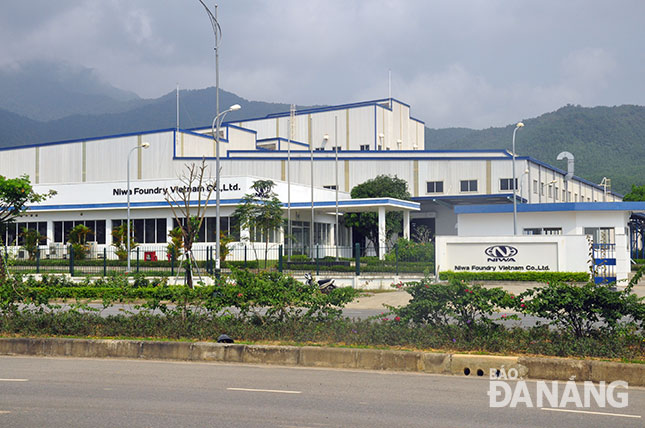Boosting administrative reforms and infrastructure development
In an attempt to attract more domestic and foreign investment inflows, apart from the issuance of preferential policies, Da Nang has combined its promoted administrative reforms and developed infrastructure systems to create a transparent and open investment environment for investors from both home and aboard.
 |
| Niwa Foundry Vietnam Co. Ltd -one of the first businesses to operate in the city Hi-tech Park (Photo: Thanh Lan) |
According to the city's Small and Medium-sized Enterprises (SMEs) Association, 97% of local private businesses are medium or small in size. Therefore, they find it very difficult to rent land in the industrial parks (IPs) because they are required to rent too large an area and pay lease annual fees. Meanwhile, to date, most of the local IPs’ rental space has been occupied.
Mr Hiromi Sugiyama, the Vice Chairman of the Japan Information Technology Service Industry Association suggested that the city authorities should consider facilitating investors to rent small land lots in IPs, citing IPs in Ho Chi Minh City as a typical example where land areas of around 3,000m2 are being leased to small-scale projects. This new land lease policy is expected to help the city attract even more domestic and foreign businesses, including Japanese SMEs.
Another issue of concern is that transport links between IPs and the city’s centre and its neighbouring localities have yet to be completely developed, with a shortage of bus routes linking to the city’s inner areas.
According to the municipal Department of Planning and Investment, in line with the city’s project for making adjustments to the development of local IPs by 2020, the city is planning to develop more IPs, namely the 2nd phase of the Hoa Cam IP covering a total area of 125.14ha, the 405.5ha Hoa Nhon IP, and the 400ha Hoa Ninh IP.
Apart from the new large-scale IPs, the city authorities have already completed related procedures to establish new ICs for small and very small-sized businesses in the near future, including the Hoa Khanh Nam and Hoa Khanh Bac ICs.
To date, the existing 6 IPs have spent a total of over 79 billion VND on developing their infrastructure facilities, and conducting their maintenance work. In addition, special heed was paid to constructing many cultural establishments for workers at these IPs, and pre-schools for their children
Especially, investors will enjoy land lease fee exemptions over the whole life of their projects which use land to develop civil engineering and technical infrastructure works, tree planting areas, public parks, facilities for State-owned agencies, hi-tech human resource training centres, accommodations for experts and employees working in the park, and other projects involved in a list of priority aspects. This is expected to enable the development of infrastructure faculties in IPs.
In particular, unused land in IPs are being taken back in order to re-lease it to businesses that are in desperate need of the land for production activities, with the priority given to manufacturing establishments in residential areas and SMEs.
With regard to the administrative reforms, the city’s government has shortened by 25% of the total time taken to grant investment licences for FDI projects, thereby facilitating the businesses to save travel and administration costs.
The municipal Department of Planning and Investment had shortened the time for investment registration procedures for projects which do not belong to the city’s investment strategies to only 8 days from the 15 days as prescribed in the national Investment Law.
Moreover, top priority has been given to accelerating the reform of customs procedures through promoting e-customs implementation. This has resulted in a significant increase in users of e-customs declaration adoption, and growing revenue from e-customs procedures.
Furthermore, the fourth-class online public service system has been applied at agencies under the management of the municipal Customs Department to implement groups of administrative procedures.
The intention is to shorten the time taken to deal with administrative procedures, thereby facilitating local residents and businesses to save travel and administration costs, and enhancing transparency of State management activities.